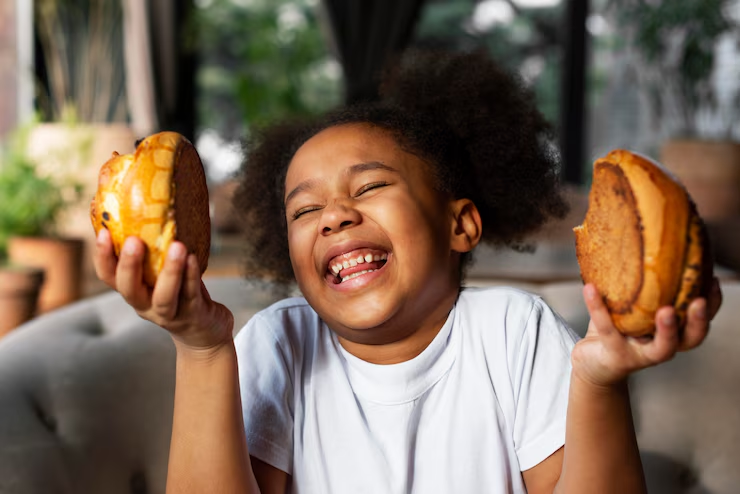Yet true godliness with contentment is itself great wealth. After all, we brought nothing with us when we came into the world, and we can take nothing with us when we leave it. So if we have enough food and clothing, let us be content. (1 Timothy 6:6-8)
I remember when I made a decision to take out snacks and juices from my children’s diet. Before the new school session began this year, my sons had grown so accustomed to having biscuits and Ribena every single day. It was like clockwork. But I knew in my heart that this was simply too much sugar, and something had to change.
I wanted to stop it, but I honestly didn’t know how to go about it. One major weakness of mine is that I hate, absolutely hate, to see my children cry. Their crying does something to my brain I can’t fully explain; it’s like a loud ringing that blocks out every other sound. I lose focus almost instantly. I know some mothers can relate. It’s like something inside just starts scrambling: your thoughts, your emotions, even your heart rate. Some of us even start negotiating with toddlers like they’re CEOs, anything to make the crying stop 😅.
But you know what? That sensitivity, though challenging, is also part of the beautiful wiring of a nurturing mum. It shows just how deeply connected we are to them. But we must still learn to respond without getting ‘hijacked’ by their tears.
My mother-in-law once said something that always brings me back to my senses: “If they didn’t cry, they wouldn’t have been released to you at the hospital.” She’s right. Parenting isn’t always about making your children happy in the moment. One thing I’ve learned quickly is this: sometimes, you have to do the hard things even if your children won’t like you for it; at least not immediately. Eventually, they’ll thank you for it. And honestly, the earlier you make those tough decisions and stick to them, the better for everyone.
So, I took out the biscuits and Ribena completely from his lunchbox and replaced them with apples.But I didn’t just yank it away. I sat him down and explained. I said:
“Sweetheart, you and John are having way too much sugar, more than your body needs. So I have to stop giving you that for school. But apples are really nice, aren’t they? They’re even better than biscuits and juice, healthier even and better for you to grow tall and strong like Daddy. Would you like that?”
He gleefully said yes. And just like that, we started the journey.
But of course, change always comes with resistance. Shortly after, he came home one day and said he wanted to take biscuits and Ribena to school just like his friends. I understood where he was coming from, comparison is natural, even at that age. But I explained again:
“Mummy is giving you what is perfect for you. Not everything your friends eat is what’s best for you. We make choices that help us grow the right way.”
I like to think of correcting them the sandwich way; love (firmness) more love. The firmness is necessary to set boundaries, but it’s always wrapped in love to help him understand I’m doing this for his good.
And that’s what contentment usually looks like: choosing what is right over what is popular, what is needed over what is wanted, and learning to trust that wisdom will always lead to joy, even if it doesn’t feel good at first.
“But godliness with contentment is great gain.” (1 Timothy 6:6)
One of the foundational bricks we must intentionally lay in our children’s hearts is contentment. Right now, the world is tilting towards “more”, more toys, more snacks, more gadgets, more trends, but we must raise children who are grounded in the truth that what God has given is enough.
Paul captures this perfectly when he said:
“Not that I was ever in need, for I have learned how to be content with whatever I have. I know how to live on almost nothing or with everything. I have learned the secret of living in every situation, whether it is with a full stomach or empty, with plenty or little. For I can do everything through Christ, who gives me strength."That word learned is striking. This means contentment may not always come naturally, it usually has to be taught, modeled, and practiced. Paul’s contentment wasn’t based on what he had, it was based on who he trusted. Contentment flows from knowing who we are, Whose we are, and trusting His provision per season.
Why Contentment Slips Away Sometimes
I’ve come to see that discontentment often creeps in when we lose sight of what truly matters, when we forget who we are and who we trust.
Sometimes it is comparison, we start comparing our lives with other people’s highlight reels, especially with all we see on social media. Other times, it is insecurity. When we’re not rooted in God’s love and provision, we start reaching for things, achievements, or people to fill the gap.
Ingratitude also plays a huge part. If we don’t pause to thank God for what we already have, we’ll always feel like we need more, even when our lives are full. And then there’s impatience with God’s timing. We want things fast, our way. When they don’t come as quickly as we hoped, we start feeling shortchanged.
Lastly, I’ve seen how too much access to excess, especially with children, just fuels more desire. If there are no boundaries, the appetite for more just keeps growing.
Start Early: Don’t Wait Until They’re Older

It’s not when your child turns four or five that you start teaching them contentment. You begin right from when they can understand words like no, come, drop that.
That’s the starting point. You teach contentment when you say,
“No, you can’t have that toy right now.”
“Come, it’s time to stop playing.”
“Drop that, it’s not yours.”
And you don’t give in just because they cry. Because right in that moment where they are screeching (permit me to use this word), they’re learning something important, which is : “I won’t always get what I want and that’s okay.”
If you wait until they’re “old enough,” you’ve already built a foundation of indulgence. But, when you start early, they grow up secure, by the time they are quite grown, they know that boundaries don’t mean lack. They mean love.
So, the earlier you start, the easier it is to build faster when they turn four or five. By then, you’re not struggling to undo entitlement, you’re simply adding more wisdom to an already healthy foundation.
Ofcourse, contentment doesn’t mean we never give our kids nice things. It means we teach them why we give them things. We teach them to receive with gratitude, to not compare, and to trust that God, mummy and daddy know what’s best.
In this way, we kill the seed of peer pressure early. We raise children who don’t follow the crowd but listen for the still, small voice within. In fact, we’re raising them to be the ones who set the right kind of pressure, the pressure to live with purpose, integrity, and godliness. We raise them to be pace-setters, standard-bearers of the highest values. Rather than being swept away by peer pressure, they stand firm, shining bright like the light God has called them to be. They become the ones others look up to, the ones their classmates admire and want to emulate.
Model Contentment
It begins with us.
Let them see us grateful when things are plenty.
Let them see us calm and thankful when we need to wait or manage.
Let them see you happy even when your car is old.
Let them watch you give thanks even when you’re believing for more.
Let them hear you speak faith, not lack even when things are tight.
That’s how you teach them the beauty of “enough.”
Scriptures on Contentment to teach your children
1 Timothy 6:6-8, Philippians 4:11–13, Hebrews 13:5, Proverbs 15:16, Ecclesiastes 4:6, Luke 12:15, Psalm 37:16, Matthew 6:31–33

Confessions for Children on Contentment
- I don’t need to have what everyone else has. God gives me everything I need, and I am thankful. (1 Timothy 6:6–8, Philippians 4:11–13, Proverbs 15:16)
- I enjoy what I have and I don’t complain. (Hebrews 13:5)
- I don’t always get what I want, but I always have what I need. (Matthew 6:31–33)
- When others have more, I don’t feel bad, I’m happy for them and grateful for mine. (Ecclesiastes 4:6)
- I am not greedy. I share, I give, and I say “thank you” always. (Luke 12:15)
- I am the light of the world. I shine brightly for Jesus wherever I go and I am and a leader for what is good.







Thank you for this reminder